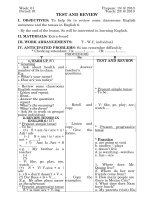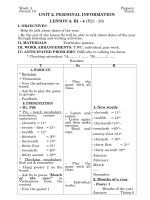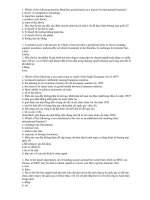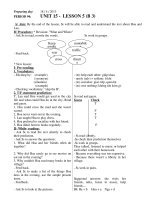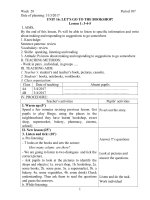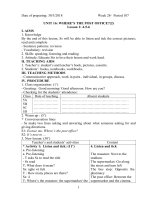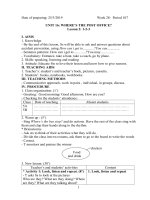English 7 week 28
Bạn đang xem bản rút gọn của tài liệu. Xem và tải ngay bản đầy đủ của tài liệu tại đây (240.23 KB, 8 trang )
Week : 28
Period: 85
Date of preparing: 10/03/2018
Date of teaching: 12/03/2018
UNIT 13: ACTIVITIES
SECTION A: SPORTS
LESSON 3: A5
I. OBJECTIVES: By the end of the lesson, students will be able to:
- Aware of safety precautions when swimming.
II. PREPARATIONS: Textbook, pictures, cassette player.
III. PROCEDURES:
*Checking attendance (1’): - 7A1:…………………………………………………………
- 7A2:…………………………………………………………
Teacher’s activities
Students’ activities
1. Warm - up (6’)
- Have Ss name some kinds of sport
- Work individually.
Badminton
soccer
2 volleyball
Basketball Some kinds of sports tennis
Baseball
Swimming
table tennis
Baseball
- Have Ss answer the question:
What is your favorite sport?
2. Presentation (13’)
- Ask questions:
+ What sport is it in the picture?
+ Do you like swimming? Why?
+ Where can we go swimming?
- Have ss read the passage about safety awareness in
the swimming pool or on the beach. Read and find
the main idea of the passage: What is the main idea
of the reading?
-Introduce new words or phrases:
I. New words:
+ safety (adj) an toàn
+ pool edge (n) cạnh của bờ hồ
+ awareness (n) nhận thức
+ obey (v) cấm
+ flag (n) cờ
+ risk (n) nguy cơ, nguy hiểm
+ lifeguard (n) cứu hộ
+ strict (a) nghiêm ngặt
+ sudden (a) đột ngột
3. Practice (18’)
Activity 1:
- Ask ss to listen and repeat (A3/p.131).
- Listen and answer the question
- Listen to the teacher.
- Listen and answer.
- Listen and write.
- Listen and repeat.
- Ask ss to practice reading.
- Read individually.
- Explain the difference between adjectives and - Take note.
adverbs and how they are used in the sentence.
II. Grammar: adjectives and adverbs
Notes:
Form: Adjective + ly Adverb of manner
Adjectives
Adverbs
Skillful
skillfully
Irregular adjective: good - well
Slow
slowly
+ Adjectives qualify nouns
Bad
badly
+ Adverbs
modify verbs
Quick
quickly
Safe
safely
Activity 2:
- Have ss read over the text (A5/p.132) then do this - Work in pairs.
exercise.
- Pay attention
- Explain some more new words.
- Call some ss to read the text loudly. Correct if there - Listen and check
a. Clear
clearly
is any mistakes
b. careful carefully
c. safe
safely
d. careless carelessly
e. strict
strictly
4. Production (5’)
- Have ss read again the passage, work in groups to
- Work in groups.
talk about the water safety awareness.
+ Do you like swimming? Why?
+ Where can we go swimming?
+ What should we prepare before going to swim?
- Call some ss of each group to tell them in front of
- Present in front of class
the class.
5. Homework (2’)
- Have ss:
- Take note
+ Learn by the lesson.
+ Prepare next lesson: Unit 13/B1, 2/ p.134, 135.
IV. COMMENTS:
...............................................................................................................................................
...............................................................................................................................................
...............................................................................................................................................
Week: 28
Period: 86
Date of preparing: 11/03/2018
Date of teaching: 13/03/2018
UNIT 13: ACTIVITIES
SECTION B: COME AND PLAY
LESSON 4: B1, 2
I. OBJECTIVES: By the end of the lesson, students will be able to learn:
- How to invite friends to play games
- How to accept or refuse the invitation
II. PREPARATIONS: Textbook, pictures, cassette player.
III. PROCEDURES:
*Checking attendance (1’): - 7A1:…………………………………………………………
- 7A2:…………………………………………………………
Teacher’s activities
Students’ activities
1. Warm - up (5’)
- Have ss play the game “Find someone who…….”
- Play game
Find s/o who…
Name
Can play soccer well
Can run quickly
Can play table tennis
skillfully
Can’t swim well
Can’t play tennis
- Ask some ss to give feedback : “ How many people - Answer.
can play table tennis skillfully”.
2. Presentation (15’)
Activity 1:
- Ask Ss some questions:
- Listen and answer the questions
1. What sports do you like?
2. Do you like playing table tennis?
3. What are Nam and ba doing ?(picture p.134)
- Have Ss listen to the tape two times.
- Explain the meaning of modal verbs:
I. New word:
+ should , ought to : nên
+ must , have to : phải
+ can, could : có thể.
+ a table tennis paddle: vợt đánh bóng bàn
+ spare (v): thay thế.
Activity 2:
- Introduce the structure
II. Modal verbs: Can/Must /Have /Ought to/ Might .
+ Affirmative :
- Listen
- Listen, repeat and take note
- Listen
IV. COMMENTS:
...............................................................................................................................................
...............................................................................................................................................
...............................................................................................................................................
Week: 28
Period: 87
Date of preparing: 15/03/2018
Date of teaching: 17/03/2018
UNIT 13: ACTIVITIES
SECTION B: COME AND PLAY
LESSON 5: B3
I. OBJECTIVES: By the end of the lesson, students will be able to:
+ Know about the sport scuba- driving
+ Use could/couldn’t to talk about one’s ability in the past.
+ Learn some more new word
II. PREPARATIONS: Textbook, pictures, cassette player.
III. PROCEDURES:
*Checking attendance (1’): - 7A1:…………………………………………………………
- 7A2:…………………………………………………………
Teacher’s activities
1. Warm - up (5’)
- Have ss give guess.
What sport is it?
One kind of sports that people can move in the
water by using activities of body such as waving
hands, waving feet….
- Lead to the lesson
2. Pre - reading (9’)
- Let ss observe a picture and guess the sport
- Ask questions to elicit the meaning of the words:
I. New words:
scuba-diving (n)
pearl diver invention (n)
special breathing equipment (n)
vessel (n)
explore (v)
deep sea (n)
- Guide ss to read
- Chek new words by: “R-O-R” game
3. While - reading (15’)
- Have Ss listen to the tape B3 (p.135) two times.
- Ask questions and check whether their answers
are correct or not.
1. What is most of the world’s surface?
2. What did Jacques Cousteau invent?
Activity 2:
- Ask ss to check the true/false statements (p.137)
- Check the answers and correct
1. Most of the world’s surface is land.
Students’ activities
- Work individually
- Listen to the teacher
- Look at the pictures and guess.
- Listen, repeat and take note
- Read
- Play game
- Listen
- Listen and answer
1. Most of the world’s surface is
land.
2. Jacques Cousteau invented
special TV cameras.
- Work in pairs.
- Check their answer.
1 F ( land water)
IV. COMMENTS:
...............................................................................................................................................
...............................................................................................................................................
...............................................................................................................................................
